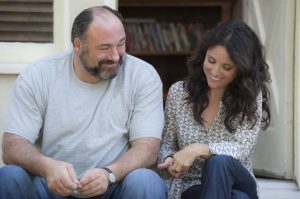As the last of the major film festivals before the awards season heats up proper, the BFI London Film Festival offers a great opportunity for awards juggernauts and smaller films alike to get an airing and to begin generating buzz/dispel any pretensions the filmmakers might have about their work (delete as appropriate). Here’s a sample of some of the offerings of the first part of the festival.
The Double
 With his directorial debut Submarine, Richard Ayoade (he of The IT Crowd fame) struggled to step out of Wes Anderson’s quirky shadow. A Dostoyevsky adaptation sounds like an odd follow-up, and odd is a good adjective for The Double, which moves away from Andersonian kitsch only to be swallowed up by Gilliam-esque grim. Jesse Eisenberg stretches his range across the dual role of Simon, a downtrodden drone in a dystopian (natch) future who meets his exact physical double, James. James then proceeds to make Simon’s hellish life more so by outshining him at work and in romance (Mia Waskiowska is a pretty object of affection, but she’s given little to work with beyond MPDG tropes). The future is all retro telephones and dusty Jetsons design rejects, and Ayoade seems less comfortable with the darker elements if the story than with the earlier, comedic scenes. It’s entertaining enough but, to be left truly Gogol-eyed, rewatch Brazil instead.
With his directorial debut Submarine, Richard Ayoade (he of The IT Crowd fame) struggled to step out of Wes Anderson’s quirky shadow. A Dostoyevsky adaptation sounds like an odd follow-up, and odd is a good adjective for The Double, which moves away from Andersonian kitsch only to be swallowed up by Gilliam-esque grim. Jesse Eisenberg stretches his range across the dual role of Simon, a downtrodden drone in a dystopian (natch) future who meets his exact physical double, James. James then proceeds to make Simon’s hellish life more so by outshining him at work and in romance (Mia Waskiowska is a pretty object of affection, but she’s given little to work with beyond MPDG tropes). The future is all retro telephones and dusty Jetsons design rejects, and Ayoade seems less comfortable with the darker elements if the story than with the earlier, comedic scenes. It’s entertaining enough but, to be left truly Gogol-eyed, rewatch Brazil instead.
Scannain rating: 2.5/5
All Is Lost
 Robert Redford has been notably picky about appearing on-screen in recent years, but the wait is worth it if the work he does is as good as All Is Lost. Redford gives one of the best performances of his career as a yachtsman adrift in the middle of the Indian Ocean. His yacht gets damaged unexpectedly, and thus the lines are drawn for an epic tale of survival at its most desperate and dignified. Storms roll in as Redford’s unnamed mariner battles to keep his vessel afloat. The strain shows in the now 77-year-old’s face, as he is thrown about like a rag-doll in a performance of admirable physicality, with minimal dialogue and shorn of vanity. Director JC Chandor (Margin Call) keeps his audience on his toes with intimate hand-held camera-work and a refusal to signpost how all this will end. Regardless of how it might end, All is Lost ensures that we’re with the good captain Redford all the way on his remarkable journey.
Robert Redford has been notably picky about appearing on-screen in recent years, but the wait is worth it if the work he does is as good as All Is Lost. Redford gives one of the best performances of his career as a yachtsman adrift in the middle of the Indian Ocean. His yacht gets damaged unexpectedly, and thus the lines are drawn for an epic tale of survival at its most desperate and dignified. Storms roll in as Redford’s unnamed mariner battles to keep his vessel afloat. The strain shows in the now 77-year-old’s face, as he is thrown about like a rag-doll in a performance of admirable physicality, with minimal dialogue and shorn of vanity. Director JC Chandor (Margin Call) keeps his audience on his toes with intimate hand-held camera-work and a refusal to signpost how all this will end. Regardless of how it might end, All is Lost ensures that we’re with the good captain Redford all the way on his remarkable journey.
Scannain rating: 4/5
Enough Said
 With its cohort of comfortable white divorcée Angelinos, Nicole Holofcener is firmly within her milieu with new offering Enough Said. That said, we’re lucky it’s a milieu she knows well and presents with confidence. The ever-lovely Julia Louis-Dreyfus goes to a party where she meets a new friend (Catherine Keener) and a new boyfriend (the late lamented James Gandolfini). It’s only when time passes she realizes that the friend and boyfriend are divorced from each other. This set-up could have turned corny in a hurry, but Holofcener and her cast keep it rooted in a grounded malaise, as all parties also look ahead to their children moving to college. Some of the sub-plots seem superfluous (though having Toni Collete in your film is always a plus), but the emphasis is firmly on Louis-Dreyfus and Gandolfini, who are a joy to behold when on screen together. Gandolfini in particular shows a grizzly warmth belaying the image of Tony Soprano. If not quite Holofcencer’s best, Enough Said is still a warm, mature and often hilarious probe of middle-age foibles, and a showcase for a great actor taken much too soon.
With its cohort of comfortable white divorcée Angelinos, Nicole Holofcener is firmly within her milieu with new offering Enough Said. That said, we’re lucky it’s a milieu she knows well and presents with confidence. The ever-lovely Julia Louis-Dreyfus goes to a party where she meets a new friend (Catherine Keener) and a new boyfriend (the late lamented James Gandolfini). It’s only when time passes she realizes that the friend and boyfriend are divorced from each other. This set-up could have turned corny in a hurry, but Holofcener and her cast keep it rooted in a grounded malaise, as all parties also look ahead to their children moving to college. Some of the sub-plots seem superfluous (though having Toni Collete in your film is always a plus), but the emphasis is firmly on Louis-Dreyfus and Gandolfini, who are a joy to behold when on screen together. Gandolfini in particular shows a grizzly warmth belaying the image of Tony Soprano. If not quite Holofcencer’s best, Enough Said is still a warm, mature and often hilarious probe of middle-age foibles, and a showcase for a great actor taken much too soon.
Scannain rating: 3.5/5
Under The Skin
 Scarlett Johannson plays an alien travelling through Scotland. This is the unlikely synopsis of one of the most compelling and singularly memorable films of the year. In Under The Skin, Johannson’s intergalactic operative (in human disguise) seduces victims across Glasgow and the surrounding countryside for means that, whilst clearly nasty, are never fully explained. This is just one of the myriad ways Under The Skin keeps us watching intently. Director Jonathan Glazer’s (Sexy Beast) unpredictable camerawork and offbeat sound design are creepily off-kilter, whilst Johannson’s disaffected performance fits in to a Scottish landscape that can seem extraterrestrial at the best of times. Unforgettable.
Scarlett Johannson plays an alien travelling through Scotland. This is the unlikely synopsis of one of the most compelling and singularly memorable films of the year. In Under The Skin, Johannson’s intergalactic operative (in human disguise) seduces victims across Glasgow and the surrounding countryside for means that, whilst clearly nasty, are never fully explained. This is just one of the myriad ways Under The Skin keeps us watching intently. Director Jonathan Glazer’s (Sexy Beast) unpredictable camerawork and offbeat sound design are creepily off-kilter, whilst Johannson’s disaffected performance fits in to a Scottish landscape that can seem extraterrestrial at the best of times. Unforgettable.
Scannain rating: 4.5/5
Like Father, Like Son
 Two families are confronted with the news that their six-year-old sons were mixed up at birth. As the hospital and families attempt to redress this situation, writer-director Hirokazu Kore-Eda’s film brings a humane sense of confusion and worry to proceedings. How could a parent deal with such news? He also touches on the clash between modern life in Japan clashing with traditional ideals of family and dignity. Unfortunately, he does so via come braod characterisations and clichéd scenes. For the most part, however, Kore-Eda creates a graceful and identifiable piece of human drama. Though lacking the subtlety that defines his best work, Like Father, Like Son certainly won’t stop Kore-Eda being compared to Yasujiro Ozu in his framing and pacing. A measured piece of filmmaking, albeit needing a little more refining.
Two families are confronted with the news that their six-year-old sons were mixed up at birth. As the hospital and families attempt to redress this situation, writer-director Hirokazu Kore-Eda’s film brings a humane sense of confusion and worry to proceedings. How could a parent deal with such news? He also touches on the clash between modern life in Japan clashing with traditional ideals of family and dignity. Unfortunately, he does so via come braod characterisations and clichéd scenes. For the most part, however, Kore-Eda creates a graceful and identifiable piece of human drama. Though lacking the subtlety that defines his best work, Like Father, Like Son certainly won’t stop Kore-Eda being compared to Yasujiro Ozu in his framing and pacing. A measured piece of filmmaking, albeit needing a little more refining.
Scannain rating: 3.5/5
Labor Day
 Following the biting wit of Juno and Young Adult, director Jason Reitman delivers something altogether toothless with Labor Day. Kate Winslet plays a depressed mother to a teenage son (Gattlin Griffith) in 1980s American suburbia. Their lives are irrevocably changed when an escaped convict (Josh Brolin) coerces them into sheltering him over the titular holiday weekend. Any potential thrills or drama are sucked out of the screenplay (written by Reitman, based on Joyce Maynard’s novel), and replaced by sickly sentimentality that will have you snorting into your popcorn with unintended laughter. Brolin escapes (just about) with his dignity intact, but try not to laugh when he shows his captives how to bake a peach cobbler. Between this, a rather rushed case of Stockholm syndrome and the permanent sunshine bathing the whole film, Labor Day is an obvious piece of Oscar bait doomed to fall flat on its face.
Following the biting wit of Juno and Young Adult, director Jason Reitman delivers something altogether toothless with Labor Day. Kate Winslet plays a depressed mother to a teenage son (Gattlin Griffith) in 1980s American suburbia. Their lives are irrevocably changed when an escaped convict (Josh Brolin) coerces them into sheltering him over the titular holiday weekend. Any potential thrills or drama are sucked out of the screenplay (written by Reitman, based on Joyce Maynard’s novel), and replaced by sickly sentimentality that will have you snorting into your popcorn with unintended laughter. Brolin escapes (just about) with his dignity intact, but try not to laugh when he shows his captives how to bake a peach cobbler. Between this, a rather rushed case of Stockholm syndrome and the permanent sunshine bathing the whole film, Labor Day is an obvious piece of Oscar bait doomed to fall flat on its face.
Scannain rating: 1.5/5

